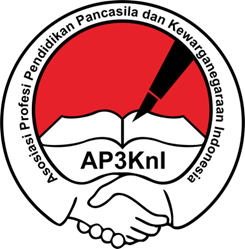The Role of Digital Literacy is the Spread of Hoax on Instagram to Strengthen the Character of Unity
DOI: https://doi.org/10.26618/jed.v7i3.8084
Digital Literacy, Character, Hoax, Instagram
Abstract
The purpose of this study is to describe understanding, perception, and problem solving for a non-medical student applying the digital literacy associated with responding to the hoax of Instagram. The study uses a qualitative approach with a theoretical design. It is often misused to disseminate information quickly but incorrectly. The research informant consists of the study program chairman, lecturer, and student elect using a sampling technique. The data-gathering techniques of this research use interviews, observation, and documentation. The validity test of data uses source triangulation and technical triangulation. Data analysis in this research uses analysis content. According to the study, non-government students have the ability to search out valid information and minimally disseminate hoax information that can lead to conflict. They claim the perception that digital literacy is important to strengthen unity in character. The application of digital literacy is important for finding the right news, making it easy to get the full information, and making a significant contribution to minimizing the spread of hoaxes in Instagram use, as well as an integral part in strengthening the character of unity, thus reducing the impact of the spread of hoax information that could divide the nation. At first glance, students have the digital literacy ability to respond to hoaxes by finding out the truth first though.References
Aminah, A., & Sari, N. (2019). Dampak Hoax di Media Sosial Facebook Terhadap Pemilih Pemula. Jurnal Komunikasi Global, 8(1), 51–61. https://doi.org/10.24815/jkg.v8i1.13565
APJII. (2022). Profil Internet Indonesia 2022.
Arafah, B., & Hasyim, M. (2022). Social Media as a Gateway to Information: Digital Literacy on Current Issues in Social Media. Webology, 19 (1).
Astuti, Y. D. (2021). Digital Literacy Competence Of Indonesian Lecturers On Analysis Hoax In Social Media. Library Philoshopy and Practice.
Awaliyah, A. N., Hartati, T., & Tursiva, E. (2020). Digital Literation in Increasing Reading Interest and Overcoming Hoax News from Social Media in Basic School Students. The 3rdInternational Conference on Elementary Education (ICEE 2020), 3.
Balqis Rahma Putri. (2021). Tingkat Problematica Internet Use Pada Mahasiswa Pariaman. NUSANTARA: Jurnal Ilmu Pengetahuan Sosial, 8, 84–89.
Bastian. (2021). Urgensi Literasi Digital dalam Menangkal Radikalisme pada Generasi Millenial di Era Revolusi Industri 4.0. Jurnal USM, Dinamika S, pp 126–133.
Fardiah, D., Darmawan, F., & Rinawati, R. (2021). Hoax Digital Literacy on Instagram. Jurnal Komunikasi Ikatan Sarjana Komunikasi Indonesia, 6 (2).
Fitriani, Y., & Pakpahan, R. (2020). Analisa Penyalahgunaan Media Sosial untuk Penyebaran Cybercrime di Dunia Maya atau Cyberspace. Cakrawala: Jurnal Humaniora Bina Sastra Informatika, 20 (1).
Ghony, M. D., & Almanshur, F. (2012). Metodologi Penelitian Kualitatif (R. T. Sari (ed.)). Ar-Ruzz Media.
Herdiansyah, H. (2019). Metodologi Penelitian Kualitatif. Salemba Humanika.
Hootsuite. (2021). Hootsuite (We are Social): Indonesian Digital Report 2021.
Irhamdhika, G. (2022). Mitigasi Hoax Di Era Disrupsi Melalui Literasi Digital. Jurnal Ilmu Komunikasi, 9 (1).
Jones, M. J., & Kim, J. K. (2018). Computers in Human Behavior,. Computers in Human Behavior. https://doi.org/10.1016/j.chb.2017.11.034
Juditha, C. (2018). Hoax Communication Interactivity in Social Media and Anticipation (Interaksi Komunikasi Hoax di Media Sosial serta Antisipasinya). Journal Pekommas, 3(1), 31. https://doi.org/10.30818/jpkm.2018.2030104
Kominfo. (2020). Data Statistik Hoaks Agustus 2018 - 31 Maret 2020.
Kurnianingsih, I., Rosini, R., & Ismayati, N. (2017). Upaya Peningkatan Kemampuan Literasi Digital bagi Tenaga Perpustakaan Sekolah dan Guru di Wilayah Jakarta Pusat Melalui Pelatihan Literasi Informasi. Jurnal Pengabdian Kepada Masyarakat, 3 (1), 61.
Kusnandar, V. B. (2022). Databooks.
Mastel. (2017). Hasil Survey Mastel Tentang Wabah Hoax Nasional.
Nurrahmi, F., & Syam, H. M. (2020). Perilaku Informasi Mahasiswa dan Hoaks di Media Sosial. Communicatus: Jurnal Ilmu Komunikasi, 4 (2). https://doi.org/10.15575/cjik.v4i2.9215
Rachmawati, T. S., Agustine, M., Perpustakaan, S., Padjadjaran, U., Km, J. R. B., Barat, J., A, J. C. N., Kidul, C., & Barat, J. (2021). Keterampilan literasi informasi sebagai upaya pencegahan hoaks mengenai informasi kesehatan di media sosial. 9(1), 99–114.
Rahadi, D. R. (2017). Perilaku Pengguna Dan Informasi Hoax Di Media Sosial. Jurnal Manajemen Dan Kewirausahaan, 5(1), 58–70. https://doi.org/10.26905/jmdk.v5i1.1342
Rizaty, M. A. (2021). Inilah Negara Pengguna Instagram Terbanyak, Indonesia Urutan Berapa?
Saputra, H. N., & Salim. (2020). Potret Sikap Mahasiswa dalam Penggunaan Digital Literacy. Jurnal Komunikasi Pendidikan, 4.
Sari, E. N., Hermayanti, A., & Faizi, N. D. R. (2021). PERAN LITERASI DIGITAL DALAM MENANGKAL HOAX DI MASA PANDEMI (LITERATURE REVIEW). Jurnal Politik Dan Sosial Kemasyarakatan, 13 (3).
Sitepu, Y. S., Harahap, H., & Trimurni, F. (2021). Digital Literacy of Soial Media Users in Medan City in Facing Hoax. International Journal of Modern Trends in Social Sciences, 4(15), 97–113. https://doi.org/10.35631/IJMTSS.415009
Susilo, M. E., Afifi, S., & Yustitia, S. (2019). Hoax as a Reflection on the Low Digital Literacy in Indonesia. In A. H. Nasution, E. A. Kadir, & L. Moutinho (Eds.), International Conference on Social, Economy, Education and Humanity (p. 168). Science and Technology Publications.
Suyanto, T., Zen, I. M., Prasetyo, K., Isbandono, P., Gamaputra, G., & Purba, I. P. (2018). The study perception of social sciences and law faculty students for hoax in social media. Journal of Physics: Conference Series, 953(1). https://doi.org/10.1088/1742-6596/953/1/012151
Syarifah, I. L., Hidayah, F. N., Raharani, F. A.-N., Azzahra, N. I., Mukarromah, S., Yulianti, Y., & Wulandari. (n.d.). Pentingnya Literasi Digital di Era Pandemi. Jurnal Implementasi, 2021.
Virga, R. L., & Adriadi, N. (2019). Digital Literacy and HOAX on Social Media. 1st Annual Internatioal Conference on Social Sciences and Humanities (AICOSH 2019). https://doi.org/https://doi.org/10.2991/aicosh-19.2019.37
Wahidin, D. (2018). Peran Internet Dalam Mewujudkan Digital Citizenship (Studi di Kampung Cyber Kota Yogyakarta). Jurnal PPKn, 6 (1), 1200–1209.
Wilson, T. D. (2000). Human Information Behavior. Special Issue on Information Sciense Research, 3 (2).
Yanti, M. (2016). Determinan literasi digital mahasiswa: kasus Universitas SriwijayaInfazatul. Buletin Pos Dan Telekomunikasi, 14 (2), 79–94.
Zulyadaini, Arif, R., & Yulianita, N. (2019). Opini Mahasiswa tentang Berita Hoax (Studi Deskriptif mengenai Opini Mahasiswa Fakultas Ilmu Komunikasi Universitas Islam Bandung tentang Berita Hoax di Instagram). Hubungan Masyarakat, 4 (2), 776–783.



